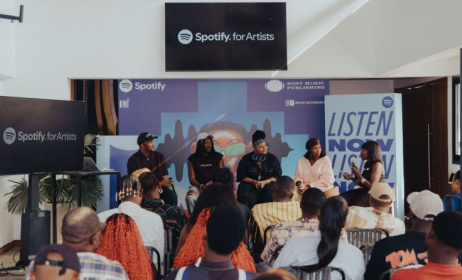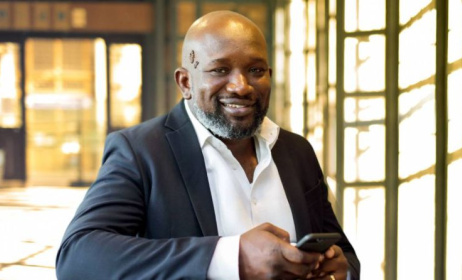Rocky Dawuni talks about Grammy hopes and Africa’s expansive sound
It was in 2019 when Ghanaian Afro-roots pioneer Rocky Dawuni and I discussed his Grammy hopes, three years after his first nomination for Best Reggae Album. It was on the set of a video shoot for his album Beats of Zion. Despite his optimism then, he missed out on being shortlisted.
 Rocky Dawuni.
Rocky Dawuni.
Three years later and Dawuni’s optimism has been rekindled as he makes his return to music’s biggest awards, competing for Best Global Music Album alongside West African heavyweights Angélique Kidjo, Wizkid and father-son Afrobeat duo Femi and Made Kuti. With South Africa’s Wouter Kellerman and Black Coffee also scoring nominations, the 64th Grammys, which were scheduled for 31 January but were postponed due to uncertainty surrounding the Omicron variant of the coronavirus, will be the edition with the most nominees from Africa, celebrating legends and sensational new voices alike.
“It’s exciting,” the ever-smiling, dreadlocked Dawuni tells me over a video call in December ahead of a concert in Accra in celebration of his latest Grammy nod. This year’s nominations, he says, honour the broad dimensions of African music and usher in a “golden age where our music can be able to reach anywhere on its own terms.”
Dawuni says his Grammy nomination in 2016 for his album Branches of the Same Tree, a first for a Ghanaian musician, is significant for the music industry in his country and proof that music from these parts has made global inroads. Its creative zest is “being respected and given due attention around the world. For an artist, whenever you release a body of work and you put in the effort and you promote it, you expect it to have resonance, acceptance, and then, when it comes to your peers, recognition of the effort and creativity that went into it.”
Dawuni’s nominations at the Grammys have come from a sound other than the Nigeria-led Afrobeats genre, which the world is lapping up at an incredible rate. For Dawuni – whose sound blends reggae, pop, Afrobeat, highlife and soul – this demonstrates that African music is far from homogeneous. “It’s a myriad of sounds. And because one sound has grown and nurtured from all these sounds, we tend to think that’s the only sound that exists.” Before Afrobeats, there was Fela’s Afrobeat and King Sunny Ade’s juju, both of which went global, he notes, “Afrobeats is not the first wave. What we have to know is that this is the opportunity for Africa to show its expanse, grandeur and power when it comes to music and culture, and I think my nomination shows that the paradigm is much bigger than just what everyone is gravitating towards,” Dawuni says, adding that he hopes his nomination will make a strong case for quality over hype.
Because both of Ghana’s direct Grammy nominations have come from Dawuni, there’s a growing notion that the West African nation’s hopes at the awards rest solely on him. When I share this observation with him, he swiftly rejects it, even though he is flattered that through him a baseline has been established to support Ghana’s music industry and the artists operating in it. And he has a point: Samini, Stonebwoy, Blackway and Fuse ODG have all appeared on Grammy-nominated projects. Dawuni attributes his Grammy success to a musical path fuelled by a pursuit for originality and constant learning and improvement of his craft, while ensuring that his music reaches as many ears as possible. “I am constantly working very hard to expand the reach of my music, and I feel every artist from my country should also have that level of work ethic. That way, we can all find success in the areas where I have found success.”
As a precursor to my follow-up question, which relates to the value of being original in the face of popular trends, I cite the chorus of ‘Difference’, a single off Voice of Bunbon Vol. 1, wondering if he could situate it in the Grammy conversation and Ghana’s quest for international success:
We cannot go wrong
If we change what will make us strong
Makes all the difference
We cannot go on
We’ve been sitting on the fence too long
Makes all the difference.
“It’s a testament about what we are who we are and how you can be the greatest expression of who you are, rather than a cheaper expression of someone else’s identity,” Dawuni elaborates. “For our music to grow and be strong, it must be steeped in our cultural sounds, our cultural melodies, our cultural rhythms. If we are all able to bring that in a way that highlights our identity, then it gives us the ability to push the boundaries of that music, and I feel that is what has informed my Afro-roots sound. ‘Difference’ is a very contemporary song but instead of a straight-cord, groove-type of Afrobeats perspective, I bring songwriting, chord changes and hooks and all of that to also add an element of contemporary songwriting to how I see that genre.
“I use everything as an opportunity to recalibrate that paradigm into something fresh and new while at the same time staying true to it. Because music has to communicate, music has to make us happy, it has to make us want to move so you don’t lose all those elements but you add something that challenges your listener to dance, listen and think differently. I think once all those elements are there, the music acquires its own ability to impact.”
For fans of Dawuni’s music, Voice of Bunbon Vol. 1 is the most unique in its author’s catalogue, specifically due to its approach to traditional motifs and an overarching goal of expanding what African music is. Because of how Dawuni has styled his sound, I wonder if he feels that his Grammy nomination in the Best Global Music Album category, as opposed to his previous nod for Best Reggae Album, is a better attempt at labelling his music. He nods. “It’s perfect labelling of what my music is. For a long time, most people heard me in terms of the reggae sound, thought of me as a reggae artist and have not had the ability to see the expanse of what my music is, which is a very broad sound that integrates many global styles. It’s Afrobeat-driven, highlife-driven, reggae-driven, songwriter-driven and at the same time message-driven and groove-driven. I feel that this nomination perfectly highlights what the Afro-roots sound is.
“Sometimes people think African music is just Afrobeats. But look at this continent and its diversity. Every country you go to is diverse with rhythms. The world has not fully felt and seen the innate cultural and musical power that lies within this continent. Through Afro-roots, I showcase all those elements in a way that does not alienate the listener.”
The Grammys present a rare conundrum. On the one hand, it is music’s biggest recognition and is, therefore, something to aspire to. On the other hand, it opens the door for Dawuni to be criticised as obsessing over Western validation. Dawuni’s thoughts: “No artist should be doing music just because of awards. I think of awards as a product of innovation and creativity that expands what we all know as the accepted norms. And once an award scheme has power on that level, it helps the industry innovate. I also feel, obviously as African musicians, that we don’t necessarily have to subscribe our music to be validated outside. But at the same time, we live in a globalised world where music doesn’t respect geography.”
Nothing is perfect, Dawuni concedes, but if an awards platform has built a brand of integrity and won the respect of fans around the world, becoming an international yardstick for measuring quality, Africans shouldn’t be afraid to be part of it. “There is a certain value to it in terms of us also wanting our sound not to be only original but globalised. If we are able to get that recognition, then that recognition is one of the things that can help shed more light on our work and music,” Dawuni says.
About whether or not he is going up against more fancied opposition, who either possess the backing of the popular Afrobeats genre, the respected Kuti lineage or a glowing track record such as Kidjo’s four Grammy trophies, Dawuni believes his nomination and the constellation of African stars representing the continent at the awards is in itself a victory for music on the continent.
“I think that this really represents the blueprint of the power of African music and its global nature: from the Fela-Femi-Made variant, to Wizkid and Angelique’s, and what I’m doing by fusing the reggae, Afrobeats, highlife and roots sounds. It’s really defining Africa now and Africa in the future.”



































Comments
Log in or register to post comments